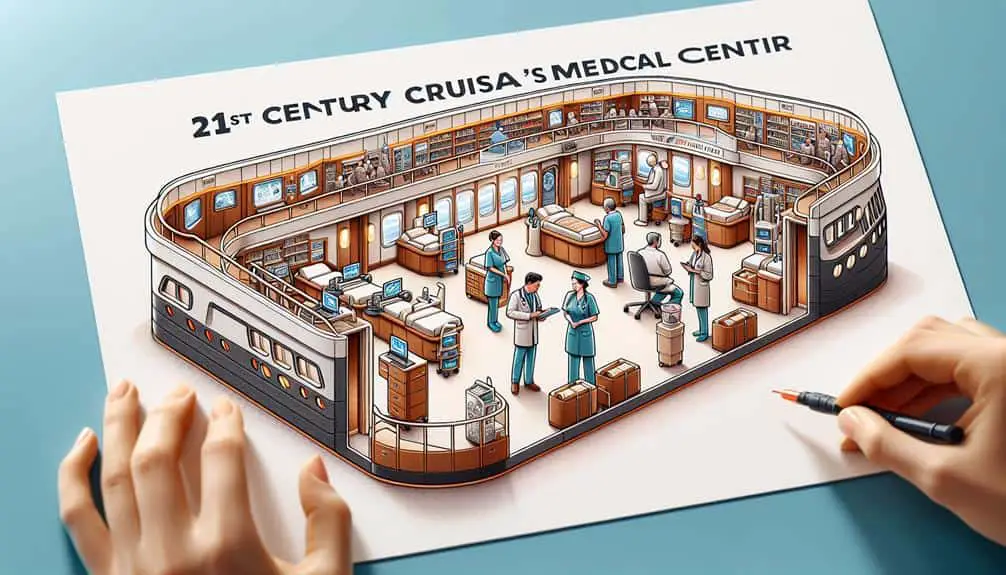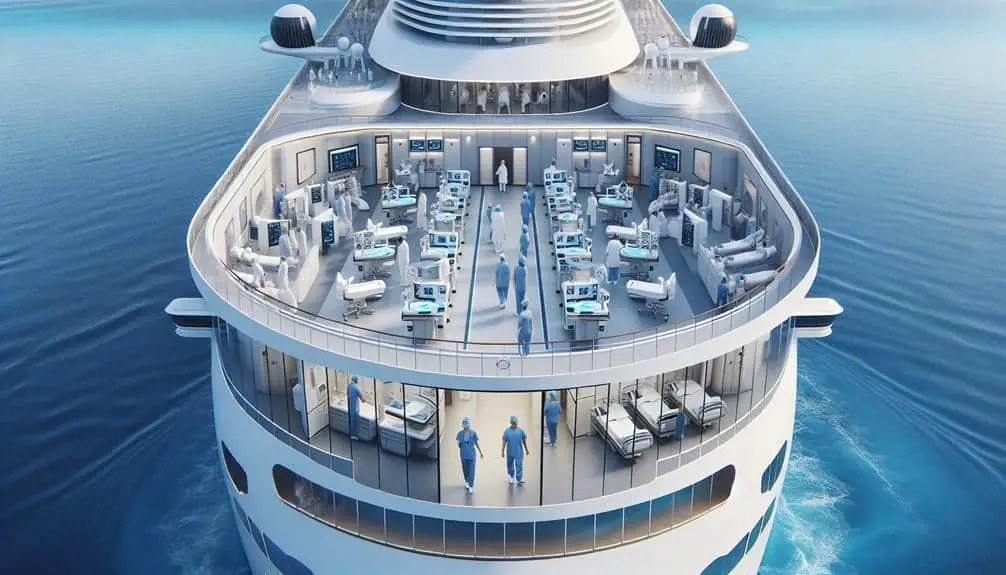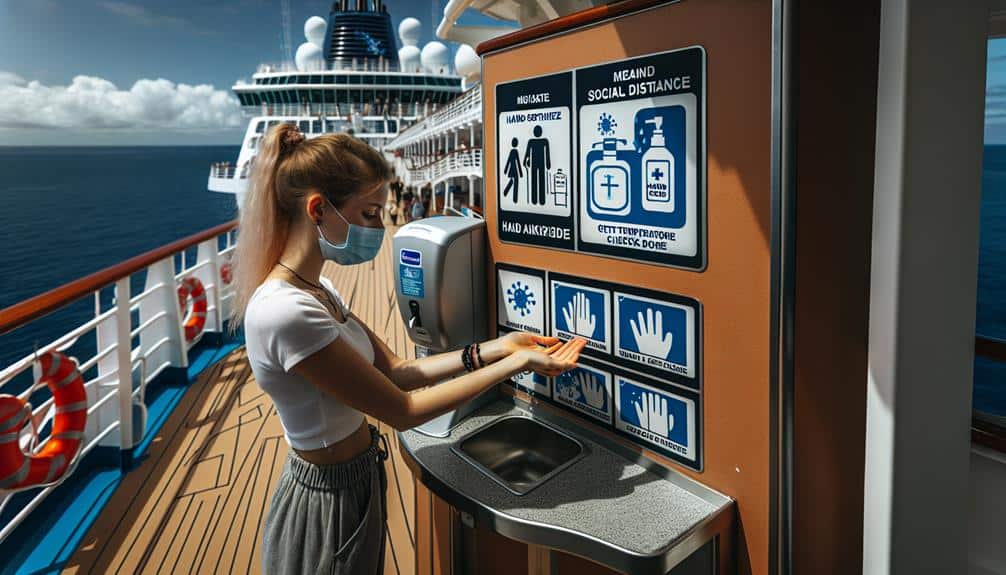In cruise ship medical centers, ensuring health and safety is of paramount importance. You must comply with stringent regulations, maintain robust emergency plans, follow meticulous hygiene protocols, provide thorough staff training, and conduct diligent equipment maintenance. Regulatory audits confirm adherence to health standards and infection control. Regular reviews of emergency response plans and drills ensure readiness. High cleanliness standards and disinfection protocols reduce infection risks. Staff certifications and ongoing training are essential for quality care. Proper maintenance of medical equipment guarantees effective treatment. To guarantee top-notch health and safety onboard, these practices are vital.
Key Points
- Regular regulatory audits monitor compliance with health standards.
- Emergency response plans undergo regular review and drills for preparedness.
- Strict hygiene protocols, including disinfection and sanitation, are vital.
- Staff must have certifications, licenses, and ongoing training for quality care.
- Maintenance of medical equipment follows strict schedules and guidelines.
Regulatory Compliance Measures
Guaranteeing regulatory compliance is a critical aspect of operating a cruise ship medical center efficiently and safely. Regulatory audits are essential to verify that the medical facility meets the necessary standards set forth by maritime health authorities. These audits assess various aspects, including infection control measures, emergency preparedness, medication management, and staff qualifications.
Infection control is a paramount focus during regulatory audits. It encompasses a wide array of practices aimed at preventing the spread of infections among passengers and crew. Stringent protocols for cleaning, disinfection, and waste management must be in place to minimize the risk of outbreaks onboard. Regular training sessions on infection control procedures are imperative to ensure that the medical staff is well-prepared to handle any potential health threats effectively.
Emergency Response Plans
Regularly reviewing and updating your cruise ship's emergency response plans is essential to guarantee the safety and well-being of passengers and crew in unforeseen situations. Emergency drills should be conducted regularly to make certain that everyone onboard is familiar with their roles and responsibilities in case of an emergency. These drills help to streamline response efforts and minimize confusion during critical moments.
Effective communication procedures are fundamental in emergency situations. Clear lines of communication between crew members, medical staff, and passengers can make a significant difference in the outcome of an emergency. Regular training on communication protocols and emergency response strategies is crucial to ensure a coordinated and efficient response in times of crisis.
Moreover, your emergency response plans should be detailed and thorough, covering a wide range of potential scenarios to adequately prepare for any situation that may arise. By prioritizing the review and enhancement of your emergency response plans, you're actively investing in the safety and security of everyone onboard your cruise ship.
Hygiene and Sanitization Protocols
Maintaining high standards of cleanliness and sanitation aboard your cruise ship is vital to safeguarding the health and well-being of passengers and crew members. Cleaning procedures and disinfection protocols should be meticulously followed to prevent the spread of infectious diseases. High-touch surfaces like doorknobs, handrails, and elevator buttons must be regularly cleaned and disinfected using EPA-approved products. Infection control and prevention measures, such as proper waste disposal and ventilation systems, are essential in minimizing the risk of illnesses onboard.
To guarantee effective hygiene and sanitization, medical centers on cruise ships must adhere to strict protocols. Medical equipment should be sanitized after each use, and medical staff must maintain proper hand hygiene at all times. Regular audits and inspections should be conducted to assess the cleanliness of the facilities and ensure compliance with health regulations. Additionally, implementing isolation procedures for contagious cases and providing training on infection control measures are critical steps in maintaining a safe and healthy environment for all onboard.
Staff Training and Qualifications
To uphold the high standards of health and safety in cruise ship medical centers, the training and qualifications of staff members are pivotal. Certification requirements for medical staff working on cruise ships are rigorous and indispensable. These requirements guarantee that the medical team possesses the necessary skills and knowledge to handle a wide range of medical situations that may arise at sea. Staff members are typically required to hold certifications in Basic Life Support (BLS), Advanced Cardiac Life Support (ACLS), and Pediatric Advanced Life Support (PALS). Additionally, medical professionals must have valid licenses to practice in their respective fields.
Continuing education opportunities are also essential for staff members to stay updated on the latest medical practices and advancements. Cruise lines often provide access to training programs and workshops to enhance the skills of their medical teams. These opportunities not only benefit the staff but also contribute to the overall quality of care provided to passengers onboard. By prioritizing staff training and qualifications, cruise ship medical centers can make sure that they're well-equipped to handle any health-related emergencies that may occur during a voyage.
Medical Equipment Maintenance
Ensuring the proper functioning of medical equipment onboard a cruise ship is essential for the timely and effective treatment of passengers and crew members. Equipment upkeep is necessary to guarantee that all medical devices are in ideal working condition. Regular preventative maintenance schedules should be established to inspect, calibrate, and service medical equipment. This proactive approach helps identify any potential issues before they escalate, reducing the risk of equipment failure during critical moments.
To maintain the integrity of medical equipment, it's critical to follow manufacturer guidelines for maintenance procedures. This includes regular cleaning, testing, and replacing of parts as necessary. Additionally, keeping detailed records of maintenance activities is crucial for tracking the history of each device and ensuring compliance with regulatory standards.
Frequently Asked Questions
How Often Are Cruise Ship Medical Centers Audited for Compliance With Health and Safety Regulations?
Cruise ship medical centers undergo regular audits to guarantee compliance with health and safety regulations. Emergency protocols are meticulously reviewed during these assessments to assure preparedness for any potential medical situations that may arise onboard.
Are There Specific Protocols in Place for Handling Medical Emergencies Involving Contagious Diseases on Board?
In handling medical emergencies involving contagious diseases on board, strict protocols are in place. Quarantine procedures and clear communication guarantee swift action. Infectious disease response prioritizes containment to safeguard all passengers and crew members effectively.
Can Passengers Request to See the Sanitization Logs for Medical Equipment Used in the Center?
You can request to see the sanitization logs for medical equipment. Knowing that staff training in equipment maintenance is a priority guarantees your safety. Patient confidentiality is maintained while upholding high sanitization standards on the ship.
What Ongoing Training Do Medical Staff on Cruise Ships Receive to Stay Updated on the Latest Medical Practices?
To guarantee excellent care at sea, medical staff on cruise ships undergo rigorous ongoing training. This includes certification requirements and regular emergency drills to enhance their skills and make certain they stay abreast of the latest medical practices and communication protocols.
How Frequently Is Medical Equipment in the Center Inspected and Maintained to Ensure Optimal Functioning?
To guarantee peak performance, medical equipment in the center undergoes frequent inspections and follows a rigorous maintenance schedule. This meticulous approach ensures that all equipment is in top condition, ready to provide high-quality care.



